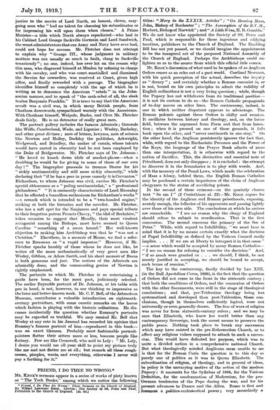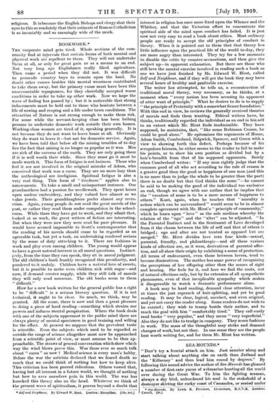FRIEND, I DO THEE NO- WRONG.*
MR. KNOXIS sermons appear in a series of works of piety known as " The York Books," among which we notice the. following • Prim', I Do Thee No Wrong : Three Sermons on the Church of England. By Ntlilfivi Lawrence Rum London : The Society of SS. Peter and. Paul, Publishers to the Church of England. [2s. 6d..1 titles: "Mary in the XXXIX. Articles"; "On Hearing Mass, John, Bishop of Rochester" ; "The Assumption of the B.V.M., Herbert, Bishop of Norwich" ; and" A LittleWine, H. R. Gamble." We do not know who appointed the Society of SS. Peter and Paul, which is responsible for these ingenious and edifying treatises, publishers to the Church of England. The Enabling Bill has not yet passed, or we should imagine the appointment to be the inaugural act of the proposed National Assembly of the Church of England. Perhaps the Archbishops could en- lighten us as to the-source from which this official title comes.
Mr. Knox's discussion, of what used to be spoken. of as Anglican Orders comes as an echo out of a past world. Cardinal Newman, with his quick perception of the actual, describes the inquiry as " dreary" ; and certainly whether a Roman canonist is, or is not, bound on his own principles to admit the validity of English ordinations is not a very living question ; while, though. the Papacy has not withdrawn from its traditional position— it is not its custom to do so—the- Roman Catholic propaganda of to-day moves on other lines. The controversy, indeed, is one in which neither disputant appears to advantage. The Roman polemic against these Orders is shifty and evasive. It oscillates between history and theology, and, on the latter field, between the argument from Form and that from Inten- tion ; when it is pressed on one of these grounds, it falls back upon the other, and "never continueth in one stay." On the other hand, the Anglican persistently ignores the fact that, while, with regard to the Eucharistic Presence and the Power -of the Keys, the language of the Prayer Book admits of more than one interpretation, it is otherwise with regard to the notion of Sacrifice. This, the distinctive and essential note of Priesthood, does not only disappear ; it is excluded : the attempt to discover it in the formularies is to play with words. And, with the memory of the Penal Laws, which made the celebration of Mass a felony, behind them, the English Roman Catholics may be pardoned a certain impatience of the claim of Anglican clergymen to the status of sacrificing priests.
In the second of these sermons—on the quaintly chosen text " So am I " (2 Corinthians xi. 22)—Mr. Knox argues for the identity of the Anglican and Roman priesthooda, exposing, acutely enough, the fallacies of his opponents and passing lightly over those of -his own side. The conclusions at which he arrives are remarkable. " I see no reason why the clergy of England should refuse to submit to reordination. That is the first concession. The second concerns the primacy of the See of Peter." While, with regard to Infallibility, " we must bear in mind that it is by no means certain exactly what the doctrine of Papal Infallibility as defined by the Vatican Council really implies.. . . If we are at liberty to interpret it in that sense " —a sense which would be accepted by many Roman Catholics- " I see no reason for refusing to consider the doctrine." And, " if so much were granted us . . . we should, I think, be not merely justified in accepting, we should be bound to accept, such terms of reunion."
The key to the controversy, finally decided by Leo XIII. (in the Bull Apostolicae etzrae, 1896), is the fact that the question of Orders did not come to the front in the sixteenth century ; that both the conditions of Orders, and the connexion of Orders with the other Sacraments, were still in the stage of theological conclusions-; and that, pre-Tridentine theology being less systematized and developed than post-Tridentine, these con- clusions, though in themselves sufficiently logical, were not universally or even generally drawn. The fear of wars of religion was never far from sixteenth-century rulers ; and we may be sure that Elizabeth, who knew her world better than any contemporary Sovereign, took the surest means to preserve the public peace. Nothing took place to break any succession which may have existed in the pre-Reformation-Church, or to affect any religious values supposed to attach to such a succes- sion. This would- have defeated her purpose, which was- to -unite a divided nation in a, comprehensive national Church. But what theologically minded Anglicans. seem unable to see is that for the Roman Curia the question is- to this- day as purely one- of politics as it was to Queen Elizabeth. The subordination of religion, of theology, and in general of ideas, Ito policy is the unvarying motive of the action of the modem a4apaey: it accounts for the Syllabus of 1864, for the Vatican
Pefinition, for the condemnation of Modernism, for the pro- 'German tendencies of the Pope during the war, and for his
present advances to France and the Allies. Rome is first and !ham: mast a politico-ecclesiastical power; very secondarily a
religious. It is because the English Bishops and clergy shut their eyes to this so resolutely that their estimate of Roman Catholicism is so invariably and so amazingly wide of the mark.



































 Previous page
Previous page